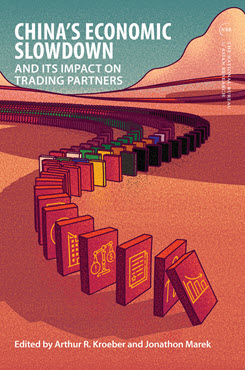Chapter in NBR Special Report 118
The Trajectory and Implications of China’s Economic Slowdown
This chapter explores the implications of China’s economic slowdown for the country’s trade and investment partners, highlighting broad takeaways from the nature of the slowdown as well as common trends from this report’s five case studies.
EXECUTIVE SUMMARY
MAIN ARGUMENT
The impacts of China’s economic slowdown are complex and operate across a number of trade and investment channels, posing policy challenges for a wide range of countries. The shift in China’s growth model will have adverse impacts on both commodity and manufacturing exporters.
POLICY IMPLICATIONS
- As China broadens its manufacturing base, it will be increasingly difficult for countries to protect their manufacturing sectors, let alone to maintain or increase their exports of manufactured goods into China. Protectionist policy measures might not be enough to effectively reverse this trend, although the rearrangement of global supply chains is likely to accelerate due to worsening trade relations between China and partners such as the U.S.
- Chinese demand for traditional commodities (e.g., oil, coal, iron, and ore) will continue to decline as infrastructure and housing are less central to China’s growth model. Demand for new commodities (e.g., lithium, nickel, and cobalt) will not likely result in the same price spikes and, therefore, will not necessarily benefit commodity exporters in the same way as previous commodity booms driven by China.
- Because of the above factors, across a wide range of countries, diversifying trading partners beyond China is a critical recommendation to mitigate economic exposure to the impacts of the country’s economic slowdown.
- China’s strict capital controls, designed to stabilize its highly leveraged financial system and control its exchange rate, will remain tight to mitigate the risk of a domestic financial crisis. Because of these restrictions and the fact that China continues to run a trade surplus, direct investment and outbound FDI will continue, in line with official strategic objectives. Recipient countries should note this report’s finding of minimal evidence that these flows meaningfully contribute to domestic growth.
Arthur R. Kroeber is Partner and Head of Research at Gavekal Dragonomics and an Adjunct Professor of Economics at the NYU Stern School of Business.
Ana Horigoshi is a Research Scientist in the Policy Analysis Unit at AidData.
Rodney Knight is a Senior Research Scientist in the Policy Analysis Unit at AidData.


